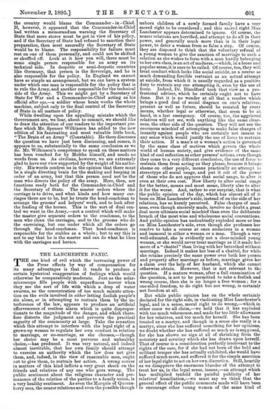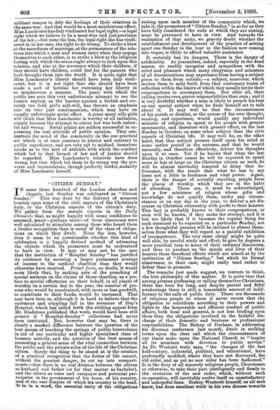THE LANCHESTER PANIC. T HE one kind of evil which the
increasing power of the Press effects by way of compensation for its many advantages is that it tends to produce a certain hysterical exaggeration of feelings which would otherwise be comparatively moderate. Just as the solar- microscope fills people with superfluous horror when they see the sort of life with which a drop of water swarms, so the concentration of too much minute atten- tion on the evils involved in either letting foolish people's sin alone, or in attempting to restrain them by the in- terference of the law, appears to produce an artificial effervescence of restless alarm which is quite dispropor- tionate to the magnitude of the danger, and which there- fore distorts the judgment and perverts the practical sagacity of the community at large. Take the sensation which this attempt to interfere with the legal right of a grown-up woman to regulate her own conduct in relation to marriage, or no-marriage, as she chooses,—though her choice may be a most perverse and unhealthy choice,—has produced. It was very natural, and indeed almost inevitable, that her own family should attempt to exercise an authority which the law does not give them, and, indeed, in the view of reasonable men, ought not to give them, to restrain her action. A wrong course in matters of this kind inflicts a very great shock on the friends and relatives of any one who goes wrong. The public sentiment about the religious character and per- manence of the relation of the parties to a family union, is a very healthy sentiment. As even the Marquis of Queens- berry sees, the nearer relations and even the possible though unborn children of a newly formed family have a very sacred right to be considered ; and this sacred right Miss Lanchester appears determined to ignore. Of course, the nearer relations are horrified, and attempt to do all in their power, and generally much more than is in their legal power, to deter a woman from so false a step. Of course, they are disposed to think that the voluntary refusal of a young woman to give the sanction of marriage to such a relation as she wishes to form with a. man hardly belonging to her own class, is an act of madness,—which, in a loose an d popular sense,it is sure to be called. Of course, too, they will treat conduct which looks like social suicide, as a course as much demanding forcible restraint as an actual attempt at suicide, from which it is usually regarded as a positive duty to restrain any one attempting it, even by the use of force. Indeed, Dr. Blandford took that view as a pro- fessional adviser, which he certainly ought not to have done. But it is no wonder at all that a resolve which brings a good deal of social disgrace on one's relatives, present as well as future, should be resisted by every means, whether legal or otherwise, that seem to be at hand., in a last emergency. Of course, too, the aggrieved relatives will not see, with anything like the same clear- ness, the other side of the question. They will not see the enormous mischief of attempting to make false charges of insanity against people who are certainly not insane in any sense which would justify the use of force to restrain their action. If a man's or a woman's action is governed by the same class of motives which govern the whole world of human society, and give evidence of the same kind of cool reflection as other persons' actions, even though they come to a very different conclusion, the use of force to restrain them from acting as they please, because it brings shame on other people, means practically an attempt to stereotype all social usage, and put it out of the power of those who do not approve that social usage, to alter it even at their own cost. Now liberty to alter social usage for the better, means and must mean, liberty also to alter it for the worse. And, rather to our surprise, that is what the public opinion of the day, which has almost all of it been on Miss Lanchester's side, instead of on the side of her relations, has so keenly perceived. False charges of mad- ness, even though sincerely made, involve no doubt a great deal more ultimate social mischief than even the deliberate breach of the most wise and wholesome social conventions. And public opinion has undoubtedly exploded more or less on Miss Lanchester's side, even though she professes her resolve to take a course at once audacious in a woman and immoral in either a woman or a man. Though a very well-educated, she is evidently not a clear-minded young woman, or she would never treat marriage as if it made her more of a " chattel" than living with her betrothed without marriage. Indeed it makes her less of a chattel, for while she retains precisely the same power over both her person and property after marriage as before, marriage gives her a claim over the help of her husband, which she cannot otherwise obtain. However, that is not relevant to the question. If a mature woman, after a full examination of the question, is not to be permitted to take a foolish and wrong course, then she is no longer a free woman ; for a one-sided freedom, to do right but not wrong, is certainly not freedom at all.
But while public opinion has on the whole certainly declared for the right side, in vindicating Miss Lanchester's legal, and in a sense, moral right to do wrong,—which in other cases we all claim,—we hold that it has exploded with too much vehemence, and made far too little allowance for her relatives, and too much for herself. She has been treated. as a martyr, and though in a sense she really is a martyr, since she has suffered something for her opinions, we doubt whether she has suffered so much as is supposed, for she has shown no sign at all of shrinking from the notoriety and scrutiny which she has drawn upon herself. That of course is a consideration perfectly irrelevant to the rights of the case, for if she had not been of the bold and militant temper she has actually exhibited, she would have suffered much more, and suffered it for the simple assertion of her legal right to act on her own discretion. Still, heartily as we disapprove the enormous blunder of the attempt to treat her as, in the legal sense, insane,—an attempt which has multiplied tenfold the painful publicity of her relatives' humiliation,—we must say we think that the general effect of the public comments made will have been to encourage other young women of the same kind of militant temper to defy the feelings of their relatives in the same way. And that would be a most mischievous effect. Miss Lana es ter has duly vindicated her legal right,—a legal right which we believe to be a most wise and just provision of the law,—but none the less, the legal right she has vindi- cated is, in her case, the right to do wrong. To strike a blow at the sacredness of marriage, at the permanence of the rela- tions into which a man and woman enter when they engage themselves to each other, is to strike a blow at the religious feeling with which the sexes ought always to look upon this relation, and also at the reverence which their children, if they should have children, could feel for the parents who have brought them into the world. It is quite right that Miss Lanchester's liberty should have been duly vindi- cated, but it is not right that she should have been made a sort of heroine for exercising her liberty in so mischievous a manner. The panic with which the public has seen this very unfortunate attempt to use the lunatic asylum as the barrier against a foolish and cer- tainly too bold girl's self-will, has thrown an emphasis into its very just condemnation, which may have an equally unfortunate social effect. A great many silly girls will think that Miss Lanchester is worthy of all imitation, simply because the attempt to coerce her was both unlaw- ful and wrong. Social panics are seldom successful in ex- pressing the real attitude of public opinion. They con- centrate the mind of the community on the one practical act which is at once contrary to justice and contrary to public expediency, and are very apt to mislead immature minds as to the sort of attitude with which the conduct which led to that breach of law and of justice should be regarded. Miss Lanchester's relatives have done wrong, but that which led them to do wrong was the per- verse and inconsiderate, though perfectly lawful, audacity of Miss Lanchester herself.



















































 Previous page
Previous page